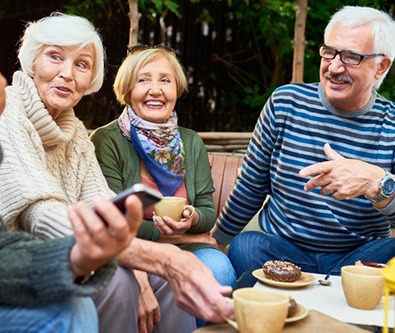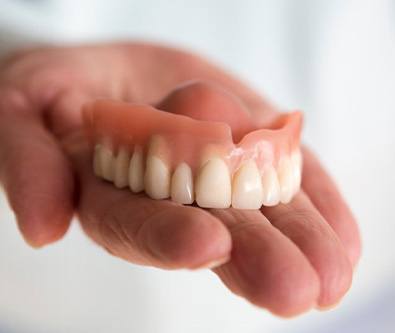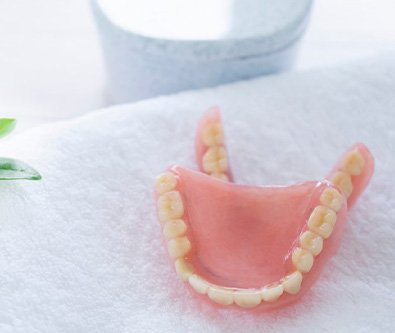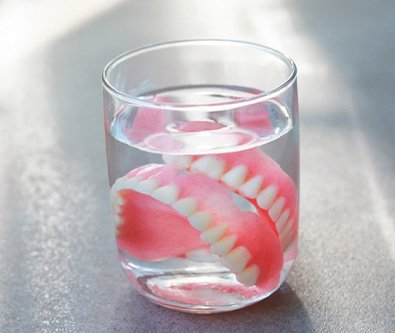Dentures – Waverly, OH
Let Us Craft You
A Brand New Smile!

Tooth loss is no joke; it can seriously hinder your capacity to speak and chew, not to mention absolutely decimating your confidence. Even if you’ve spent a lot of time without teeth and you feel like you’re used to it, having a mouth full of teeth will make a massive difference in your quality of life.
So if you’ve lost most or all of your teeth, a set of dentures could be just what you need. The team here at our office can give you a prosthetic that can completely replace every tooth you’ve lost all at once, quickly and easily. Give us a call, and let us craft you a brand new smile!
Why Choose Corcoran Privitera Family Dental For Dentures?
- Friendly, Dedicated Husband-and-Wife Dentists
- Advanced Digital Impression System for Comfortable, Accurate Modeling
- In-Network with a Wide Range of Insurance Plans
Who's a Good Candidate for Dentures?

Dentures are well-suited to replacing many different teeth at once, so whether you’re missing just a couple of teeth, or one or both arches of pearly whites, you could be a great candidate for this solution! If you’re ready to schedule a consultation with us to address your tooth loss, don’t wait to get started—but in the meantime, here’s more about why you shouldn’t hesitate to replace missing teeth and some considerations you’ll need to keep in mind if you’re thinking about dentures.
Effects of Missing Teeth

According to the American College of Prosthodontists, the most common causes of missing teeth involve gum disease, advanced tooth decay, and physical trauma. Infected gums mean the connective tissue that holds your pearly whites in place is compromised. And sometimes, a tooth that’s decayed beyond repair may require extraction to preserve your oral health. Of course, a blow to the mouth during a sporting event or accident can also cause a tooth to become displaced. But regardless of how teeth are lost, it can spell bad news for the rest of your smile!
One key concern is that the jawbone can begin shrinking due to a lack of stimulation that the tooth roots used to provide. Of course, daily tasks like eating and speaking will also be notably more difficult. Furthermore, you might experience complications like facial sagging, which lowers your self-esteem. All in all, nothing good can come out of missing teeth.
What Qualifies You for Dentures?

Most patients who suffer from extensive tooth loss, whether due to decay, trauma, or other issues, are eligible to receive dentures, but you’ll need to speak with us first so we can perform an evaluation. Our team knows exactly what to look for; during your visit, we’ll determine which type of denture you’ll need (full, partial, or implant) and assess your smile to ensure that you have healthy gum and jawbone tissue. Also note that dentures tend to be more affordable than some other tooth replacement options, making them a great choice for those on a limited budget.
Alternative Tooth-Replacement Options

If dentures aren’t a good option for you, our team might be able to provide you with alternative tooth-replacement solutions. These include:
- Dental bridges – These restorations are ideal for patients missing a few teeth in a row along the same arch. In order for them to work, you’ll need to have healthy teeth on either side of the gap to support the bridge.
- Dental implants – These refer to titanium posts that can be placed directly into the jawbone, in order to act as replacement tooth roots. A custom-made dental restoration can be placed on top. This option requires sufficient bone density and has a higher upfront cost, but comes with impressive benefits and longevity.
Types of Dentures

There are many different kinds of dentures, each suited different patients with their own particular needs. We’ll be able to give you a better sense of what prosthetic would work for you when we meet you in person, but until then, here’s some information about each of them.
Partial Dentures

Partial dentures are designed to replace most, but not all, of the teeth on a ridge. They consist of a set of false teeth that are attached to the natural ones via small metal hooks, allowing them to affix firmly in place.
Full Dentures

Full dentures are meant to replace all of the teeth on a gum ridge. Given that there are no surrounding teeth to hook onto, they will have to be meticulously crafted adhere to the gums entirely via suction.
Full dentures are made out of acrylic, affording them a comfortable fit that allows them to sit securely on the gums.
Implant Dentures

Implant dentures are similar to full dentures except that they’re attached to thin metal posts surgically placed into the jaw. While a bit more involved, this process gives your prosthetic additional stability. It also improves the durability of your prosthetic, meaning you’ll like save money on replacements in the long run.
Benefits of Dentures

Your dentures are going to be designed to fit you perfectly, meaning that you can expect not only a comfortable fit, but also absolutely stunning realism from your prosthetic. You’ll see benefits in multiple aspects of your life, giving you good reason to smile often and show off your pristine replacement teeth! To enjoy everything dentures have to offer, schedule a consultation with our team today. We’ll be happy to show you all the ways dentures can improve your day-to-day experience.
Psychological Benefits

Studies show that those with missing teeth often lose social confidence. They’re also more likely to develop depression or anxiety as they grapple with the effects of tooth loss. When your smile is restored with dentures, you’ll feel much more like yourself, able to smile, eat, and enjoy full oral function.
Clearer Enunciation

When you have gaps along your dental line-up, it can be harder to pronounce certain sounds. Air might whistle through empty spaces, or you might be unable to press your tongue against your teeth properly. After those gaps are filled with dentures, you’ll have no problem enunciating clearly.
Improves Nutrition

Did you know that effective chewing is really important for digestion? Grinding up your food enables saliva to coat it with a special enzyme that makes it easier for your stomach to absorb essential nutrients. Missing teeth can impair the process, so with a reliable set of dentures, you’ll actually be able to get more out of your meals.
Preserves Oral Health

Your oral structure responds to dental gaps in two main ways. The first is dental drift: when teeth become crooked trying to compensate for the empty space. The second is jawbone loss: teeth help the jawbone circulate and receive sustaining nutrients, so when they go missing, the bone starts to deteriorate. Dentures can help slow the rate of jawbone loss and completely prevent dental drift.
Expands Opportunity

Studies also show that those with an attractive, full smile are more likely to be hired, promoted, and receive raises from their employers. In addition to the benefits listed above, dentures could very well expand your opportunities within the workforce!
Dentures Aftercare

Getting a new pair of dentures is an exciting step toward restoring your full smile, but keeping them in great condition requires implementing a few measures. With the right habits, your dentures will stay comfortable, functional, and reliable for many years to come. Here are some simple tips to make sure your prosthetics remain in the best shape possible.
Remove After Eating

After eating, be sure to remove and rinse your dentures thoroughly and carefully. This helps clear away food bits, plaque, and bacteria that could otherwise irritate your gums or increase your risk of infection. Skip hot water when rinsing, since high heat can warp your dentures and affect how they fit.
Clean Your Prosthetics

Dentures should be taken out before cleaning so you can reach every surface, especially the side that rests on your gums. Use a soft-bristled brush with gentle soap or a denture cleanser. Regular toothpaste can be a bit too abrasive. When you’re done brushing, place them in water or a cleansing solution to keep them moist and properly shaped. Always rinse thoroughly before putting them back in.
Keep Your Dentures Safe

Since dentures can potentially break if dropped, it’s a good idea to clean them over a towel or sink filled with water. This should help soften the impact in case of an accident. Be sure to also store them in a safe spot out of reach of pets and children to avoid damage whenever you aren’t wearing them. Ensuring their safety can help you save yourself trouble and money in the long run.
Remove Dentures When You Sleep

Although you may wear dentures continuously for the first 24 hours after getting them, you should take them out at night after that. Sleeping with dentures can lead to gum irritation, reduced circulation, or other oral issues. Removing them also gives your gums a chance to recover and stay healthy. Place them in water or a soaking solution overnight to keep them from drying out or losing their shape.
Notice Changes

As you adjust to wearing dentures, pay attention to any changes in comfort or fit. If you notice soreness, looseness, or damage, contact your dentist right away. They can adjust or repair your dentures to ensure they continue working properly. Avoid trying to fix them yourself, as this could make the problem worse. Instead, allow your dental team to help handle any changes for you.
